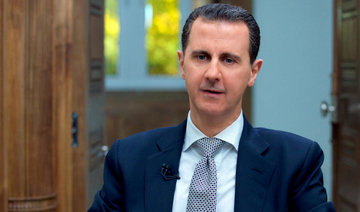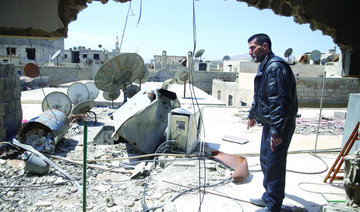THE HAGUE: Syrian authorities — “abetted by Russia’s continuing efforts to bury the truth” — still possess and use chemical weapons, an American diplomat told the international chemical weapons watchdog on Thursday.
The strong comments by Kenneth D. Ward, the American ambassador to the Organization for the Prohibition of Chemical Weapons (OPCW), came amid ongoing diplomatic skirmishes over last week’s deadly attack in Syria.
Ward used a hastily convened meeting of the organization’s executive council to launch a withering verbal attack on Syrian President Bashar Assad and his allies in Moscow.
The meeting was called to discuss the April 4 attack on the Syrian town of Khan Sheikhun that killed nearly 90 people. The US and other Western governments blame Assad’s regime. Washington in retaliation launched missile strikes on a Syrian air base they say was the starting point for the chemical weapons attack, a move that ratcheted up tensions between the US and Syria’s ally Russia.
Russia and Syria claim the Khan Sheikhun victims were killed by toxic agents released from an opposition chemical arsenal hit by Syrian warplanes.
But Ward insisted it was a deliberate attack that amounted to “a direct affront to the Chemical Weapons Convention and, indeed, a direct affront to human decency, carried out by a state party” to the OPCW, according to the text of his speech that was posted on the organization’s website.
Syria joined the OPCW in 2013 under severe international pressure following a deadly chemical attack on a Damascus suburb. Assad’s regime told the organization it had a 1,300-ton stockpile of chemical weapons and chemicals used to make them. That stockpile was destroyed in an operation overseen by the Nobel Peace Prize winning-group OPCW, but ever since there have been questions about whether Assad had declared all his weapons.
“On April 4, the bodies of innocent victims, grotesquely contorted and twisted by the nerve agent sarin, tell the real story,” Ward said. “Syria provided a grossly incomplete declaration to the OPCW of its chemical weapons program. It continues to possess and use chemical weapons.”
He added that “this outrage is abetted by Russia’s continuing efforts to bury the truth and protect the Syrian regime” form consequences of using chemical weapons.
Britain’s Ambassador, Sir Geoffrey Adams, told the meeting that UK scientists have analyzed samples from Khan Sheikhun and they “tested positive for the nerve agent sarin, or a sarin-like substance.”
Earlier this week, Turkish doctors also said that test results conducted on victims confirmed that sarin gas was used.
The OPCW’s Fact Finding Mission for Syria is conducting an investigation and is expected to report its findings in three weeks. The organization has not revealed any details, citing the need to preserve the integrity of the probe and the safety of OPCW staff.
In Moscow, Russian Foreign Minister Sergei Lavrov said Thursday that OPCW inspectors should visit both the Syrian air base, which the US said served as a platform for the attack, and Khan Sheikhun to get a full and objective picture.
He said Russia vetoed a draft UN resolution Wednesday because it failed to mention the need to inspect the area of the attack.
“We are deeply worried by our partners in the UN Security Council trying to evade an honest investigation into that episode,” he said.
Syria, abetted by Russia, still possesses and uses chemical weapons: US
Syria, abetted by Russia, still possesses and uses chemical weapons: US

Egypt hosts 1.2 million Sudanese, with ‘hundreds’ arriving daily: UN

The war between rival Sudanese generals since April 2023 has killed tens of thousands of people and displaced more than 11 million, with 3.1 million of them seeking shelter beyond the country’s borders, according to the UN.
Egypt currently hosts 546,746 Sudanese refugees who are officially registered with the United Nations’ refugee agency UNHCR, as well as others who are awaiting registration, said Christine Bishay, associate external relations officer at UNHCR Egypt.
A UNHCR report issued on Friday said that “recent data from the government of Egypt indicates that more than 1.2 million Sudanese have sought international protection in Egypt.”
This has made the North African country the largest host of Sudanese refugees despite imposing stricter entry requirements during the war in Sudan, which shares a long border with Egypt.
Sudanese nationals “now make up two-thirds of the country’s total registered refugee population” of 827,644 people representing 95 nationalities, including Syria, South Sudan and Eritrea, she said.
“Initially, at the very beginning of the conflict, thousands of Sudanese arrived in Egypt on a daily basis, before stabilising to a few hundreds per day,” Bishay added.
Cairo had initially waived visa requirements for Sudanese women, children and men over 50 at the start of the war.
But a month after the conflict erupted, the Egyptian government introduced visa entry requirements for all Sudanese, leaving many to resort to irregular crossings.
In September this year, Egypt further tightened entry requirements, obliging people entering from Sudan to obtain “prior security clearance” alongside a consular visa, according to Egypt’s interior ministry.
Raga Ahmed Abdel Rahman, a 27-year-old Sudanese woman who crossed into Egypt illegally in August, told AFP she had paid about 500,000 Sudanese pounds ($830) to travel in a pick-up truck with 16 others.
The desert journey, which took a gruelling day and a half, was “exhausting and terrifying,” Abdel Rahman said.
“We were constantly afraid of being stopped by RSF forces,” she added, referring to the Sudanese paramilitary Rapid Support Forces who have been battling the regular army.
Hundreds of thousands of others who fled Sudan have sought refuge primarily in neighboring countries, including Chad, South Sudan and Libya.
In the report published on Friday, UNHCR Egypt warned that the humanitarian crisis caused by Sudan’s war has placed “immense pressure on Egypt’s resources and infrastructure.”
Hanan Hamdan, UNHCR representative to Egypt’s government and the Arab League, said that “the burden on Egypt is unsustainable and requires immediate and substantial international assistance to ensure the protection and well-being of those affected by the conflict.”
UNHCR also noted that so far, just over half of the funding needed for an aid scheme for Sudanese refugees has been secured.
The Sudan Humanitarian Response Plan 2024 “has received $1.52 billion in funding, which is 56.3 percent of the required $2.7 billion,” the UN agency said.
“Despite this significant contribution, the funding gap remains substantial.”
Five Iranian security forces killed in attack in Sistan-Baluchistan province

- Iranian forces launched a major operation in the area after an attack on October 26 killed 10 police officers
TEHRAN: At least five members of Iran’s security forces were killed Sunday in a “terror attack” in the restive southeast, where authorities have been conducting operations against rebels, local media reported.
The Fars news agency reported that in a “terror attack in Saravan county, in the south of the Sistan-Baluchistan province, five members of the security forces were killed.”
Sistan-Baluchistan borders both Afghanistan and Pakistan, and is one of Iran’s most impoverished provinces. It is one of the few mainly Sunni Muslim provinces in Shiite-dominated Iran.
For years it has faced unrest involving drug-smuggling gangs, rebels from the Baluchi minority and extremists.
Fars said that after the attack in Saravan, “units stationed in the region were quickly deployed to pursue the criminals.”
Iranian forces launched a major operation in the area after an attack on October 26 killed 10 police officers.
That attack was later claimed by the Pakistan-based Sunni jihadist group Jaish Al-Adl (Arabic for Army of Justice).
Local media reported that those behind the October attack have been killed in the current security operation.
Some 15 militants have been reported killed in Sistan-Baluchistan province since the October attack, including three on Sunday, state television said.
It also said more than 30 suspects have been arrested.
Formed in 2012 by Baluch separatists, Jaish Al-Adl is designated a terrorist organization by both Iran and the United States.
Israel PM says okayed Lebanon pager attacks

- Hand-held devices used by Hezbollah operatives detonated in supermarkets, on streets and at funerals in mid-Sept.
- They killed nearly 40 people and wounded nearly 3,000, and preceded Israel’s ongoing military operation in Lebanon
JERUSALEM: Prime Minister Benjamin Netanyahu said on Sunday he okayed a deadly September attack on Hezbollah communications devices which exploded in Lebanon, the first time Israel has admitted involvement.
Hezbollah had previously blamed its arch-foe for the blasts that dealt a major blow to the Iran-backed militant group, and vowed revenge.
“Netanyahu confirmed Sunday that he greenlighted the pager operation in Lebanon,” his spokesman Omer Dostri told AFP of the attacks.
Hand-held devices used by Hezbollah operatives detonated two days in a row in supermarkets, on streets and at funerals in mid-September.
They killed nearly 40 people and wounded nearly 3,000, and preceded Israel’s ongoing military operation in Lebanon.
Hezbollah began low intensity strikes on Israel in support of Hamas following its ally’s October 7, 2023 attack on Israel which triggered the Gaza war.
Strikes have intensified since war broke out in Lebanon in late September, when Israel escalated its air campaign against Hezbollah and later sent ground troops into south Lebanon.
Israel PM says okayed Lebanon pager attacks

- Hand-held devices used by Hezbollah operatives detonated two days in a row in supermarkets, on streets and at funerals in mid-September
- They killed nearly 40 people and wounded nearly 3,000
JERUSALEM: Prime Minister Benjamin Netanyahu said on Sunday he okayed a deadly September attack on Hezbollah communications devices which exploded in Lebanon, the first time Israel has admitted involvement.
Hezbollah had previously blamed its arch-foe for the blasts that dealt a major blow to the Iran-backed militant group, and vowed revenge.
“Netanyahu confirmed Sunday that he greenlighted the pager operation in Lebanon,” his spokesman Omer Dostri told AFP of the attacks.
Hand-held devices used by Hezbollah operatives detonated two days in a row in supermarkets, on streets and at funerals in mid-September.
They killed nearly 40 people and wounded nearly 3,000, and preceded Israel’s ongoing military operation in Lebanon.
Hezbollah began low intensity strikes on Israel in support of Hamas following its ally’s October 7, 2023 attack on Israel which triggered the Gaza war.
Strikes have intensified since war broke out in Lebanon in late September, when Israel escalated its air campaign against Hezbollah and later sent ground troops into south Lebanon.
Netanyahu says spoke again with Trump about Iran ‘threat’

- “We see eye to eye on the Iranian threat in every aspect,” Netanyahu said
- Analysts believe Netanyahu had hoped for a Trump return to the White House
JERUSALEM: Israeli Prime Minister Benjamin Netanyahu’s office said Sunday he had spoken three times with US president-elect Donald Trump over the past few days about the “Iranian threat” to Israeli security.
“In the last few days, I have spoken three times with President-elect Donald Trump... Talks designed to further tighten the strong alliance between Israel and the US,” Netanyahu said, quoted in a statement issued by his office.
“We see eye to eye on the Iranian threat in every aspect,” he added during a weekly cabinet meeting, according to the statement.
Netanyahu also said he had talked to Trump about “great opportunities before Israel in the field of peace and its expansion.”
The United States is Israel’s top ally and military backer, and the election came at a critical time for the Middle East amid wars in Gaza and Lebanon.
Analysts believe Netanyahu had hoped for a Trump return to the White House, given the longstanding personal friendship between the two as well as the former president’s hawkishness on Israel’s arch-foe Iran.
During his first term, Trump moved the US embassy to Jerusalem, recognized Israeli sovereignty over the occupied Golan Heights and helped normalize ties between Israel and several Arab states under the so-called Abraham Accords.

















